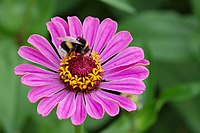Bloom Clock/Keys/Southeastern Pennsylvania/October/Red Flowers
The plants pictured below have been recorded as blooming during the month of October in Southeastern Pennsylvania.
Zinnia violacea
 Wikipedia • Commons • Wikibooks (horticulture) • Wikibooks (subject) • Wikispecies • Fruit and seed clock |
Profile for Zinnia violacea (Zinnia)
Recent Logsedit | ||
Global data:
Amaranthus caudatus
 Wikipedia • Commons • Wikibooks (horticulture) • Wikibooks (subject) • Wikispecies • Fruit and seed clock |
Profile for Amaranthus caudatus (Love lies bleeding)
Recent Logsedit | ||
Global data:
Rosa
 Wikipedia • Commons • Wikibooks (horticulture) • Wikibooks (subject) • Wikispecies • Fruit and seed clock |
Profile for Rosa (Rose)
Recent Logsedit
| ||||||||||||||
Global data:
Temperate zone season(s): Late Spring, Early Summer, Mid Summer, Late Summer, Early Fall Mid Fall, Late Fall
Chrysanthemum x morifolium
 Wikipedia • Commons • Wikibooks (horticulture) • Wikibooks (subject) • Wikispecies • Fruit and seed clock |
Profile for Chrysanthemum x morifolium (Hardy Chrysanthemum, Mum)
Recent Logsedit | ||
Global data:
Temperate zone season(s): Mid Fall, Late Fall, Early Winter
Phlox paniculata
 Wikipedia • Commons • Wikibooks (horticulture) • Wikibooks (subject) • Wikispecies • Fruit and seed clock |
Profile for Phlox paniculata (Garden Phlox)
Recent Logsedit | ||||||||||||
Global data:
Temperate zone season(s): Early Summer, Mid Summer, Late Summer, Early Fall, Mid Fall, Late Fall, Early Winter
Pentas lanceolata
 Wikipedia • Commons • Wikibooks (horticulture) • Wikibooks (subject) • Wikispecies • Fruit and seed clock |
Profile for Pentas lanceolata (Pentas)
This page contains recent bloom logs for the plant Pentas lanceolata (Pentas). If you saw this plant blooming today (or sometime within the last 3 days), you can help improve the bloom clock by logging it. Just click on "edit" next to the Recent Logs heading, add *~~~~ (an asterisk followed by four tildes) on a new line just below the last signature, and then click "save page". This will add your signature and the date to log the plant. Please make sure you've signed up on the contributors' page so that we can know the location of the plant you saw blooming and use your contribution to create a flora for your region! When you're done, you can go back to one of the main pages and find logs of other flowers you might have seen today.
Recent LogseditArchived Logsedit(If there are more than 5 signatures under the recent logs heading, move the oldest logs to under this heading (generally leave the 3 most recent).
| ||
Global data:
Lonicera x heckrottii
 Wikipedia • Commons • Wikibooks (horticulture) • Wikibooks (subject) • Wikispecies • Fruit and seed clock |
Profile for Lonicera x heckrottii (Flame Honeysuckle)
Recent Logsedit | ||||||||||||||
Global data:
Temperate zone season(s): Mid Winter, Mid Spring, Late Spring, Early Summer, Mid Summer, Late Summer, Early Fall, Mid Fall, Late Fall, Early Winter
Salvia splendens
 Wikipedia • Commons • Wikibooks (horticulture) • Wikibooks (subject) • Wikispecies • Fruit and seed clock |
Profile for Salvia splendens (Scarlet Sage)
Recent Logsedit | ||
Global data:
(updated 12:06, 11 October 2007 (UTC) with 8 plants)